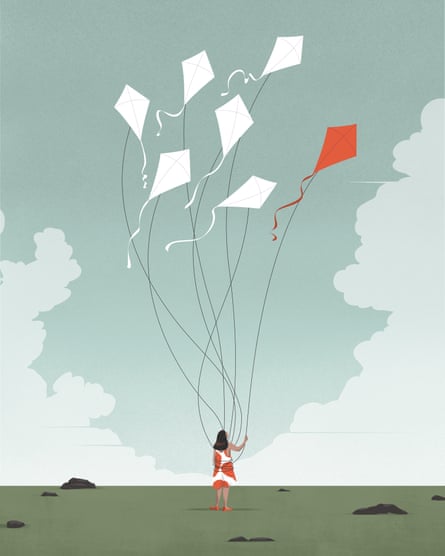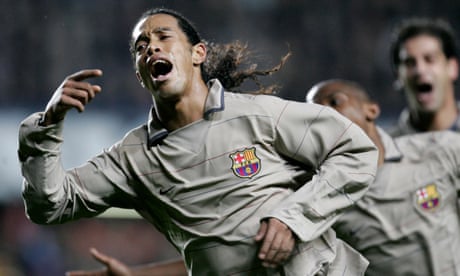To escape an unresolved work challenge, Archimedes went to the local baths. As he got into the water and noticed the liquid spilling over the edge, it happened. The mathematician jumped up and ran home naked, crying “Eureka! I’ve found it!” Over two millennia later, in 2010, it is Gwyneth Paltrow’s 38th birthday weekend in Italy. Her eureka moment is involuntary, like “the ring of a bell that has sounded and cannot be undone”. She knew her marriage was over. Soon after I read about this incident in her infamous conscious uncoupling essay, I saw a name on an email and knew I’d date that person, without knowing who they were or what they looked like. Whether it’s the Archimedes principle or a divorce from Chris Martin or love-at-first-email, intuition is a funny, evasive thing with human consequences.
Following these sudden realisations or hits of intuition used to be the way I lived: a bell would ring out and I’d run fully clothed but without fear from one opportunity to the next. It’s hard to quantify a “just knowing” in the body. If forced to, I’d say my intuition would be instant, inexplicable and irrational. Like if you told the nearest person what you’d just learned, they’d rigidly smile, get up and change seats. For example, I’ve known I’d work at a specific company after hearing it mentioned in a classroom; as with Archimedes, the idea for my first book dropped into my head fully formed; and like Paltrow, I’ve known jarringly, in an otherwise content moment, that a relationship was absolutely over. I’d get it with small, seemingly unimportant things, too. I’d think of a loved one I hadn’t spoken to in months and a minute later they’d call needing my help. This could sound like magical thinking or a collection of unremarkable coincidences. I sincerely don’t know how damning this phenomenon is to write about because, until recently, I hadn’t spoken in depth to anyone about it. But I do suspect that for many of us, intuition is not a completely foreign experience.
About 10 months ago, my internal workings changed. A year prior, I’d followed these moments of intuition into a dream job, new neighbourhood, new friends and a relationship with the person I thought was the love of my life. I was blissfully happy. My world felt so big, as though if I kept using this medium, anything was possible. But almost immediately, it all disappeared in an abrupt and undignified manner. This lightning bolt of change seemed to bring with it the loss of my intuition.
I have the uncanny feeling of existing outside the flow of life. It’s different to being depressed, it’s more energetic and esoteric: an awareness that everything is growing, flourishing and dying, connections and signs are being traded, and you’ve slipped out of nature’s systemisation. I’m watching the sky for a signal and nothingness stares back at me. I’m not without purpose, but I feel stagnant, disoriented. It seems impossible to make future plans without the inner guidance I once trusted.
Then I realised that if intuition is real, I can study it and try to bring it back.
Despite intuition being one of the most significant concepts in western philosophy, central to the ancient Greeks (Plato and Aristotle), through to thinkers of the early modern period (Descartes) and romanticism (Kant), ideas about it differ. Science and psychology don’t conclusively know what it is either, with research typically building on the work of Nobel prize-winning psychologist and economist Daniel Kahneman, who proposed that we have two different thought systems: one is fast and intuitive, the other is slower and analytical. These various disciplines do, however, acknowledge that it’s important and they do believe it’s real.
Joel Pearson, a psychologist, neuroscientist and author of the forthcoming book The Intuition Toolkit, has given the subject a working definition in order to study it: the learned use of conscious information to improve decisions or actions. “Most people think of it as the gut response,” he tells me. “You feel it in the body and you don’t know where it comes from. It’s knowing what without knowing why.”
Through his research, Pearson has learned that intuition is incredibly useful in a number of situations – and potentially disastrous in others. He uses the acronym Smile. S is for self-awareness: if you’re feeling emotional, don’t trust your intuition. M is for mastery: you need to actually know about the area in which you’re being intuitive. Don’t take a lucky gamble on the stock market based on gut feeling when you know nothing about finance. I is for impulses: you’re not feeling an intuitive draw towards food, drugs, social media… those are cravings. L is for low probability: don’t use intuition for probabilistic judgments. “Anything with numbers or probabilities: whatever you feel is probably wrong,” Pearson says. And the last is E for environment: only trust your intuition in familiar – therefore fairly predictable – environments.

Gut instinct: it can be tremendously effective, but can you trust it? Illustration: Ana Yael
While Pearson insists there is nothing otherworldly about intuition, other branches of knowledge romanticise it in this way. Philosophers Henri Bergson and Carl Jung are famous for infusing something more into its origins. In multiple religious traditions, intuition is associated with a path to the divine. “There’s always been this mystical spiritual overlay, even in the very oldest senses of the term,” says Lisa Osbeck, professor of psychology at the University of West Georgia and co-editor ofthe philosophical book Rational Intuition.
Osbeck has noticed, as I have, that intuition is the latest popular wellness expression. Online courses, coaches and lifestyle influencers encourage followers to heed their intuition, “intuit” the information around them, and live an intuitive life. Together we hypothesise about why this is happening now: a lack of trust in the media, an abundance of information hitting us in our lives and on our screens – everyone telling us what to do to do life right – and a decline of organised religion leaving a spiritual hunger to be sated. “There’s a special appeal to just trusting this bedrock within us,” she says. If the messaging from outside us is stressful and contradictory, then at least there is this sanctified ideal of a trusted inner compass.
In my most discreet asking-for-a-friend voice, I question why people might typically say that they’ve lost their intuition. “They’ve lost confidence in their own judgment,” Osbeck answers. “It’s less threatening to attach it to some special ability that you can gain or lose, like ‘the muse’. It takes the responsibility away from the person.”
I take this eviscerating read of the situation on the chin, but part of me resists. Only I am responsible for acting blindly on intuition and I know that. I now needed to speak to someone who combines all the disciplines: philosophical, psychological and the spiritual. Someone like Fleur Leussink, who trained in neuroscience, became a spiritual adviser to the stars, and now works as an intuition teacher. When she mentioned on the phone she was doing an intuition retreat soon, the first intuitive hit in months arrived: I knew I had to be there.
To use intuition, you must go from the overthinking of the mind into the body and as such, Leussink’s week-long intuition retreats focus on nervous system regulation. This happens with relative ease when you’re deep enough in the Italian countryside with non-committal signal and no internet, the workshop room has the ambience of a church and you’re hugged by woodland from every direction. Days were bookended with various different breathing practices, meditations and somatic movements that forced our bodies to feeling more grounded. This, Leussink advised, “makes space for intuition to rise” up in us.
To benefit from a retreat, you have to see it as a container without the scaffolding of social mores and your own governing rules of embarrassment. Mealtimes were a chance to learn why other people were there. It was mostly women, of all ages, from Europe, the US and Canada. Some had been through paradigm-shattering losses that made mine look petty and provincial. I quickly gravitated towards one woman in her mid-20s, whose intuition had pushed her into a break-up and to consider changing her PhD entirely; she wanted to learn how to harness whatever that mystery force was. Everyone had the same barrier to action, they were seeking reassurance: this intuition thing is real, right?
In classes about the psychology and practice of intuition, we got closer to an answer. Leussink’s take on intuition felt true to my experience: “Energetic information translated by the body into conscious thought about you, for you.” The emotion-releasing meditations and movements we were doing made sense as the week progressed – the different feelings located in a body included echoes of trauma, spikes of anxiety, empathy for the moods of the people around us, all distinct from intuition. When you have all that going on, Leussink said, how can you possibly recognise the more subtle prompts?
In one session, she asked us to remember the times we experienced intuition in our lives. I listed them in my notebook. You may believe intuition accidentally happened to you, she explained, but you were in the space for it to happen: calm, most likely in theta brainwave (the brainwave found when meditating or doing something repetitive), crucially not thinking about the pressing questions you are now mulling over (see Archimedes’s moment of truth).
It doesn’t mean you have to take its guidance, it is just another perspective, she said. It’s then that I understood what my question had been all along: what was my intuition for? It led me through chaotic and extreme places and left me at square one emotionally and practically. When I asked, Leussink explained that it was a philosophical question that we had to answer for ourselves. “For me, intuition is for living your most expansive life,” adding that crucially, “that’s not necessarily the easiest road, but it can be the most transformative.” This is the moment everything slides into 20/20 clarity. Above anything else, intuition has led me to evolution and something like self-awareness.
A dozen times over the week, I let myself think about the real reason I was there: through my intuition I had found a charged and true relationship, inside of which, suddenly, nothing was what it seemed. I remembered the moment I felt someone walking up behind me and knew they would change my life forever. Imagining that outdoor seating area, I could smell the cheap coffee in front of me, feel the warmth of Los Angeles in its coldest months, remember that knowledge landing in my body, then the heavy movement of his jacket as he strode around and sat down in front of me. I wanted to compel the past: don’t have that knowing, please don’t or do. I’m not sure. You don’t know what I know now.
One night while lying in my bed, I listened to a message my friend had sent me. She’d just finished an intense whirlwind romance, having missed what we now love to culturally diagnose as red flags. “At least you learned something valuable,” I stoically wrote back, after a long day of observing autumn leaves fall and anthropomorphising my own slow but inevitable ability to heal on to trees. She replied: “Fuck lessons, man.” It was fair enough.
On the last day, Leussink gave us an exercise with a pendulum to access our beliefs around intuition. Given why I’m here, I assumed my subconscious belief was that I don’t believe it’s safe to trust it – that would be keeping my intuition away. But it wasn’t.
Do I believe it is safe for me to follow my intuition? My subconscious mind gave a quiet but unwavering yes – following my intuition is safe for me. My conscious mind said no. Of course, deep down I believe my intuition is supportive of me in some way, because that’s been my default setting. It’s my conscious mind that is struggling with the lack of safety. I understand why that is, because I don’t want more change, I don’t want more pain. What Osbeck suggested, Leussink confirmed: the problem wasn’t with intuition, it was with me. There is no over-intellectualising something as straightforward and primeval as intuition. Imbue it with spiritual intention or don’t. It will run across the state lines of your body like a train in the night, and then it’s gone.
While Pearson insists there is nothing otherworldly about intuition, other branches of knowledge romanticise it in this way. Philosophers Henri Bergson and Carl Jung are famous for infusing something more into its origins. In multiple religious traditions, intuition is associated with a path to the divine. “There’s always been this mystical spiritual overlay, even in the very oldest senses of the term,” says Lisa Osbeck, professor of psychology at the University of West Georgia and co-editor ofthe philosophical book Rational Intuition.
Osbeck has noticed, as I have, that intuition is the latest popular wellness expression. Online courses, coaches and lifestyle influencers encourage followers to heed their intuition, “intuit” the information around them, and live an intuitive life. Together we hypothesise about why this is happening now: a lack of trust in the media, an abundance of information hitting us in our lives and on our screens – everyone telling us what to do to do life right – and a decline of organised religion leaving a spiritual hunger to be sated. “There’s a special appeal to just trusting this bedrock within us,” she says. If the messaging from outside us is stressful and contradictory, then at least there is this sanctified ideal of a trusted inner compass.
In my most discreet asking-for-a-friend voice, I question why people might typically say that they’ve lost their intuition. “They’ve lost confidence in their own judgment,” Osbeck answers. “It’s less threatening to attach it to some special ability that you can gain or lose, like ‘the muse’. It takes the responsibility away from the person.”
I take this eviscerating read of the situation on the chin, but part of me resists. Only I am responsible for acting blindly on intuition and I know that. I now needed to speak to someone who combines all the disciplines: philosophical, psychological and the spiritual. Someone like Fleur Leussink, who trained in neuroscience, became a spiritual adviser to the stars, and now works as an intuition teacher. When she mentioned on the phone she was doing an intuition retreat soon, the first intuitive hit in months arrived: I knew I had to be there.
To use intuition, you must go from the overthinking of the mind into the body and as such, Leussink’s week-long intuition retreats focus on nervous system regulation. This happens with relative ease when you’re deep enough in the Italian countryside with non-committal signal and no internet, the workshop room has the ambience of a church and you’re hugged by woodland from every direction. Days were bookended with various different breathing practices, meditations and somatic movements that forced our bodies to feeling more grounded. This, Leussink advised, “makes space for intuition to rise” up in us.
To benefit from a retreat, you have to see it as a container without the scaffolding of social mores and your own governing rules of embarrassment. Mealtimes were a chance to learn why other people were there. It was mostly women, of all ages, from Europe, the US and Canada. Some had been through paradigm-shattering losses that made mine look petty and provincial. I quickly gravitated towards one woman in her mid-20s, whose intuition had pushed her into a break-up and to consider changing her PhD entirely; she wanted to learn how to harness whatever that mystery force was. Everyone had the same barrier to action, they were seeking reassurance: this intuition thing is real, right?
In classes about the psychology and practice of intuition, we got closer to an answer. Leussink’s take on intuition felt true to my experience: “Energetic information translated by the body into conscious thought about you, for you.” The emotion-releasing meditations and movements we were doing made sense as the week progressed – the different feelings located in a body included echoes of trauma, spikes of anxiety, empathy for the moods of the people around us, all distinct from intuition. When you have all that going on, Leussink said, how can you possibly recognise the more subtle prompts?
In one session, she asked us to remember the times we experienced intuition in our lives. I listed them in my notebook. You may believe intuition accidentally happened to you, she explained, but you were in the space for it to happen: calm, most likely in theta brainwave (the brainwave found when meditating or doing something repetitive), crucially not thinking about the pressing questions you are now mulling over (see Archimedes’s moment of truth).
It doesn’t mean you have to take its guidance, it is just another perspective, she said. It’s then that I understood what my question had been all along: what was my intuition for? It led me through chaotic and extreme places and left me at square one emotionally and practically. When I asked, Leussink explained that it was a philosophical question that we had to answer for ourselves. “For me, intuition is for living your most expansive life,” adding that crucially, “that’s not necessarily the easiest road, but it can be the most transformative.” This is the moment everything slides into 20/20 clarity. Above anything else, intuition has led me to evolution and something like self-awareness.
A dozen times over the week, I let myself think about the real reason I was there: through my intuition I had found a charged and true relationship, inside of which, suddenly, nothing was what it seemed. I remembered the moment I felt someone walking up behind me and knew they would change my life forever. Imagining that outdoor seating area, I could smell the cheap coffee in front of me, feel the warmth of Los Angeles in its coldest months, remember that knowledge landing in my body, then the heavy movement of his jacket as he strode around and sat down in front of me. I wanted to compel the past: don’t have that knowing, please don’t or do. I’m not sure. You don’t know what I know now.
One night while lying in my bed, I listened to a message my friend had sent me. She’d just finished an intense whirlwind romance, having missed what we now love to culturally diagnose as red flags. “At least you learned something valuable,” I stoically wrote back, after a long day of observing autumn leaves fall and anthropomorphising my own slow but inevitable ability to heal on to trees. She replied: “Fuck lessons, man.” It was fair enough.
On the last day, Leussink gave us an exercise with a pendulum to access our beliefs around intuition. Given why I’m here, I assumed my subconscious belief was that I don’t believe it’s safe to trust it – that would be keeping my intuition away. But it wasn’t.
Do I believe it is safe for me to follow my intuition? My subconscious mind gave a quiet but unwavering yes – following my intuition is safe for me. My conscious mind said no. Of course, deep down I believe my intuition is supportive of me in some way, because that’s been my default setting. It’s my conscious mind that is struggling with the lack of safety. I understand why that is, because I don’t want more change, I don’t want more pain. What Osbeck suggested, Leussink confirmed: the problem wasn’t with intuition, it was with me. There is no over-intellectualising something as straightforward and primeval as intuition. Imbue it with spiritual intention or don’t. It will run across the state lines of your body like a train in the night, and then it’s gone.


